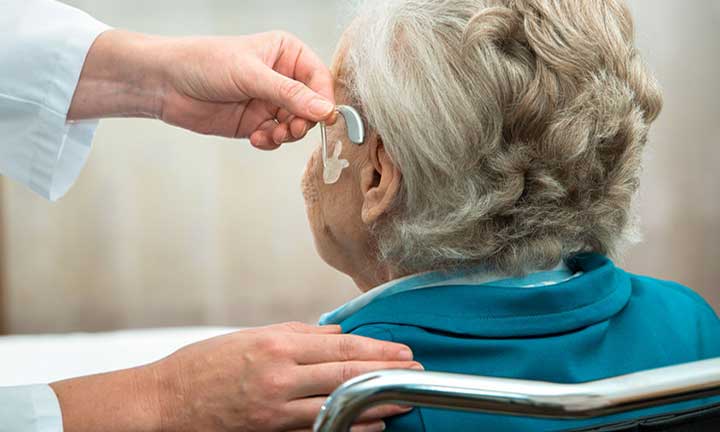
Hearing loss has long been considered a natural part of aging, but emerging research continues to highlight its profound impact on brain health.
Age-related hearing loss (Presbycusis) is a condition that will affect nearly every person in society. The prevalence of hearing impairment doubles with each age decade, such that nearly two-thirds of adults 70 years of age and older have a meaningful hearing loss that affects daily communication.
Studies have consistently demonstrated a strong link between hearing impairment and an increased risk of cognitive decline, including dementia and Alzheimer’s disease. The earliest of such kind of research was a case-control study published in the Journal of the American Medical Association nearly 22 years ago. But due to various reasons, this study received little attention until recently, and today scientists have confirmed the association between untreated hearing loss and dementia and Alzheimer’s disease.
What is the evidence for Hearing loss and Dementia / Alzheimer’s disease
- Growing evidence has suggested that hearing impairment is independently associated with a 30–40% rate of accelerated cognitive decline and with a substantially increased risk of incident all-cause dementia.
- Compared to individuals with normal hearing, people with a mild, moderate, and severe hearing impairment, respectively, had a 2-, 3-, and 5-fold increased risk of incident all-cause dementia over >10 years of follow-up.
- Neuroimaging studies have also shown independent associations between hearing impairment and reduced cortical volumes in the auditory cortex and accelerated rates of lateral temporal lobe and whole brain atrophy.
The Link Between Hearing Loss and Cognitive Decline
Hearing loss can lead to cognitive decline through several mechanisms:
- Reduced Brain Stimulation – The auditory system plays a crucial role in keeping the brain engaged. When hearing declines, parts of the brain responsible for processing sound receive less stimulation, potentially leading to atrophy in regions critical for memory and cognition.
- Increased Cognitive Load – When individuals struggle to hear, the brain reallocates resources from cognitive functions like memory and problem-solving to auditory processing. This additional strain can contribute to cognitive fatigue and decline over time.
- Secondary insult to brain – Reduced stimulation from the impaired cochlea (organ of hearing) may precipitate changes in cortical reorganization and brain morphometry, which may act as a “secondary insult” to the brain in patients with other underlying clinical conditions.
- Social Isolation and Depression – Hearing loss often leads to withdrawal from social interactions due to difficulty in communication. Social isolation and depression have both been identified as independent risk factors for dementia.
Latest Research Insights
- In a recent study published in the journal Neuron, a team of researchers from New Castle University proposed a new theory regarding the relationship between hearing loss and dementia or Alzheimer’s disease. They postulated that memory centres deep in the temporal lobe of the brain, associated with long-term memory for places and events, are also involved in the short-term storage and manipulation of auditory information. Researchers propose that altered activity in the memory system caused by hearing loss and the Alzheimer’s disease process trigger each other.
- Two other recent studies published in JAMA Otolaryngology provide further evidence of the impact of hearing loss on cognitive health:
- Hearing Aids and Cognitive Function: A large-scale study found that the use of hearing aids significantly reduces the risk of cognitive decline in older adults with hearing impairment. Participants who consistently used hearing aids showed a lower incidence of dementia compared to those who did not use them, reinforcing the importance of early intervention in hearing loss management.
- Hearing Intervention and Brain Health: Another study focused on the biological mechanisms behind hearing loss and cognitive decline, indicating that untreated hearing impairment leads to accelerated shrinkage of brain structures associated with memory and decision-making. The findings suggest that timely hearing rehabilitation could help preserve brain function and delay the onset of dementia.
The Importance of Early Intervention
Given the strong association between hearing loss and dementia, proactive steps are essential:
- Regular Hearing Screenings – Early detection of hearing loss can lead to timely interventions, reducing the risk of cognitive decline.
- Use of Hearing Aids and Assistive Devices – Evidence suggests that consistent use of hearing aids can slow cognitive deterioration and improve quality of life.
- Maintaining Social Engagement – Staying connected with family and friends can help mitigate the effects of social isolation and provide cognitive stimulation.
- Adopting a Healthy Lifestyle – A combination of physical exercise, a balanced diet, and cognitive activities can further support brain health.
Hearing loss is not merely an inconvenience but a significant factor in cognitive aging. The latest research underscores the importance of addressing hearing impairment early to reduce the risk of dementia and Alzheimer’s disease.
If you or a loved one are experiencing hearing difficulties, seeking professional evaluation and considering hearing aids could be a crucial step in safeguarding long-term brain health. By prioritizing hearing care, we can enhance overall well-being and potentially delay or prevent cognitive decline.
References
- Lin FR, Albert M. Hearing loss and dementia–who is listening?.
- Hung SC, Liao KF, Muo CH, Lai SW, Chang CW, Hung HC. Hearing loss is associated with risk of Alzheimer’s disease: a case-control study in older people. Journal of epidemiology. 2015 Aug 5;25(8):517-21.
- Uhlmann RF, Larson EB, Rees TS, Koepsell TD, Duckert LG. Relationship of hearing impairment to dementia and cognitive dysfunction in older adults. JAMA. 1989;261(13):1916–1919.
- Timothy D. Griffiths, Meher Lad, Sukhbinder Kumar, Emma Holmes, Bob McMurray, Eleanor A. Maguire, Alexander J. Billig, William Sedley. How Can Hearing Loss Cause Dementia? Neuron, 2020
- Yeo BSY, Song HJJM, Toh EMS, et al. (2022) Association of hearing aids and cochlear implants with cognitive decline and dementia: a systematic review and meta-analysis. JAMA Neurol. In press.